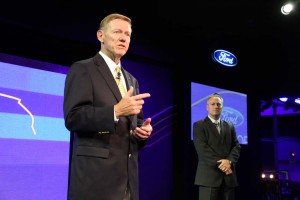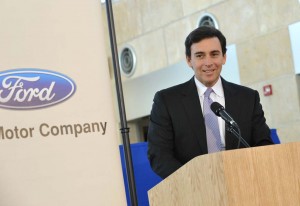For the moment, at least, Ford Motor Co. officials are downplaying reports that CEO Alan Mulally will soon depart for a new job as the top executive at tech giant Microsoft – but even if the 68-year-old Mulally doesn’t head to Seattle his tenure in the Motor City is likely to come to an end relatively soon.
The question is what that will mean for Ford, the only Detroit automaker to avoid bankruptcy – and a subsequent federal bailout. What worries many observers is the possibility the second-largest domestic maker will return to the bad old ways that Mulally set out to change when he came onboard in late 2006.
“There is no change to what we announced in November,” Ford’s new Chief Operating Officer Mark Fields said when asked about the flurry of reports linking Mulally to Boeing.
Ford’s CEO previously worked in Seattle where he was one of the top executives at aircraft maker Boeing, and he retains strong ties to that community. But were he to return, Mulally might instead step into the shoes of Steve Ballmer, the controversial Microsoft chief who last month said he would step down within the next year, setting off speculation about who might replace him.
To many observers, a strong hint came in July as Ballmer unveiled a reorganization plan he dubbed One Microsoft – something that was strongly influenced by the One Ford plan Mulally implemented soon after his move to Detroit.
While the two giants operate in very different industries, Microsoft faces some of the same critical challenges as Ford, notably an assault by increasingly powerful competitors such as Apple and Google. The Seattle firm also struggles with what many analysts describe as a highly charged and politicized environment that tends to create political fiefdoms which, in turn, limit the creativity needed to stay on top in fast-changing world of software and consumer electronics.
(It’s “inevitable” that a woman will become a Big 3 CEO, says GM Chairman Akerson. Click Herefor that story.)
In that sense, however, Microsoft is much like Ford. The automaker was arguably the most politicized of the domestics when Mulally came onboard. Senior executives struggled to expand their power bases and minimize any sense of weakness – even if it meant covering up problems. The CEO often points to an early meeting with senior managers who, to a one, insisted everything was on track even as – Mulally pointedly noted – Ford was about to report the worst loss in its history.
(Could former Renault COO Carlos Tavares be a wild card candidate for Ford CEO? Click Here for more.)
Mulally quickly pressed for a more cooperative culture that encouraged top management to openly discuss problems – and then to move rapidly to get them fixed. While Ford still has its problems, the maker is now solidly in the black, is delivering double-digit margins and is considered one of the most efficient and effective manufacturers in the auto industry.
Despite a few signs of infighting, the management team is working smoothly enough that Mulally has pulled back from day-to-day operations – handing those to COO Fields – and put his own focus on longer-term, strategic issues.
(Ford delivers unexpectedly strong earnings, margins for Q2. Click Here for the full story.)
Pointing to Fields, analyst Joe Phillippi, of AutoTrends Consulting suggests that the CEO job is “his to lose,” when Mulally ultimately departs. The first question, of course, is when Mulally will step down. Even if he doesn’t take the Microsoft job, the executive has promised to stay on only through the end of 2014, a mere blink of the eye at the pace the auto industry normally operates.
There are other contenders who might still snag the support of Ford Chairman Bill Ford Jr. and the company’s board of directors if Fields falls out of favor. Most notably, there’s Joe Hinrichs who until recently headed the auto company’s fast-growing Asian operations and now holds Fields’ old spot as President of the Americas.
A wild card contender is former Renault COO Carlos Tavares who recently left the French maker after publicly expressing his interest in becoming CEO of Ford or GM.)
One factor that could pose a challenge for Fields — even before Mulally leaves – is Ford’s tendency towards political intrigue. Having a long-term chairman who is also a family heir changes the dynamics within the company, observers assert, and encourages power struggles.
Going back to what was long regarded as business-as-usual could cripple the maker, whomever is at the helm.
In recent comments, COO Fields insisted Ford’s new approach, where company comes first, isn’t going to change – and he seemed to be stressing that would be the case even if Mulally were to return to Seattle. “We have so many opportunities in front of us. We’re focusing on those opportunities and not getting distracted by anything.”
One way or the other, we’re likely to see big changes in the corporate suite at Ford in the near future – very near if Mulally does head to Microsoft, but only slightly longer even if he decides to play out his career at Ford.


